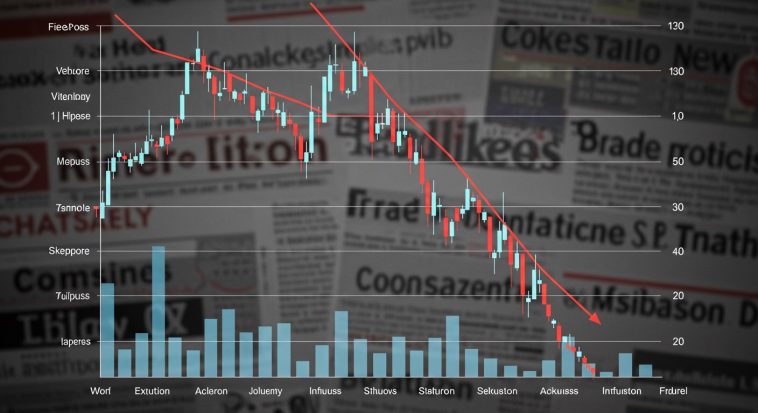As trade policy uncertainty continues to escalate, consumer confidence has experienced its largest monthly decline in nearly four years. The Conference Board’s Consumer Confidence Index for February came in at a reading of 98.3, marking a significant drop from January’s revised reading of 105. This decline fell short of the 102.5 reading expected by economists, signaling a growing unease among consumers.
Impact on Consumer Confidence
The sharp decline in consumer confidence is largely attributed to trade policy uncertainty, which has fueled inflation expectations. The average 12-month inflation expectations jumped from 5.2% last month to 6% in February, echoing concerns over tariffs and their potential impact on household staples like eggs. This increase likely reflects a mix of factors, including sticky inflation and the expected effects of tariffs, according to Stephanie Guichard, senior economist at the Conference Board.
Economic Indicators
Present Situation Index: This measure of consumers’ assessment of current business and labor market conditions fell to 136.5 in February from 139 in January. This decrease indicates a slight weakening in consumers’ perception of the current economic environment.
Expectations Index: The index, which tracks consumers’ short-term outlook for income, business, and labor market conditions, also fell to 72.9 from 82 last month. Historically, a reading below 80 in this category signals a potential recession in the coming year. This was the first time since June 2024 that the index came in below that threshold, raising concerns about future economic stability.
Trade Policy and Inflation
President Trump’s revived tariff threats have weighed heavily on consumer sentiment. The administration’s plans for tariffs on Canada, Mexico, and China, along with potential duties on autos, chips, and pharmaceuticals, have raised significant inflation concerns. A flat tariff “in the neighborhood of 25%” is expected to apply to all foreign automakers starting as soon as April 2. These policies have led to a sharp increase in mentions of trade and tariffs in consumer responses, echoing levels not seen since 2019.
Economic Implications
The broad-based decline in confidence across income groups is particularly concerning, as affluent consumers have driven much of the recent spending. If this trend continues, it could lead to weaker economic growth. Yelena Shulyatyeva, senior U.S. economist at the Conference Board, noted that consumer spending has been largely driven by those at the top of the income spectrum. “That is a concern,” Shulyatyeva said. “If this is going to slow down significantly, that’s a concern for the economy.”
Eugenio Aleman, chief economist at Raymond James, wrote that it’s still “up in the air” whether this lack of confidence will translate to weaker economic growth. However, Aleman warned that the upward move in inflation expectations and the increase in mentions regarding the potential effects of tariffs should serve as a wake-up call for the administration. A second estimate of gross domestic product for the fourth quarter, due later this week, will serve as the latest test of the economy’s resilience.
As trade policy uncertainty continues to impact consumer confidence, it remains crucial to monitor how these factors influence economic growth. The interplay between trade policy uncertainty, inflation, and consumer spending will be pivotal in shaping the economic landscape in the coming months.



